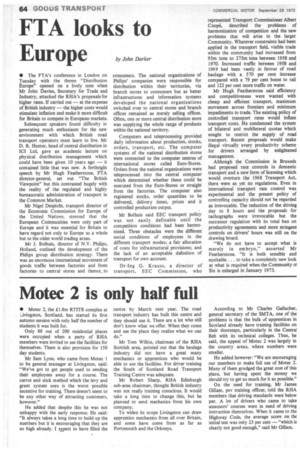FTA looks to
Page 348

If you've noticed an error in this article please click here to report it so we can fix it.
Europe by John Darker
• The FTA's conference in London on Tuesday with the theme "Distribution Europe" opened on a lively note when Mr John Davies, Secretary for Trade and Industry, attacked the RHA's proposals for higher rates. If carried out — at the expense of British industry — the higher costs would stimulate inflation and make it more difficult for Britain to compete in European markets.
Subsequent speakers found difficulty in generating much enthusiasm for the new environment with which British road transport operators must learn to live. Mr D. R. Hunter, head of central distribution in ICI Ltd, gave an academic lecture on physical distribution management which could have been given 10 years ago — it contained little that was new. A forthright speech by Mr Hugh Featherstone, FTA director-general, set out "The British Viewpoint" but this contrasted hugely with the reality of the regulated and highly bureaucratic administration of transport in the Common Market.
Mr Nigel Despicht, transport director of the Economic Commission for Europe of the United Nations, stressed that the European Communities were only part of Europe and it was essential for Britain to have regard not only to Europe as a whole but to the older world trading areas.
Mr J. Bolhuis, director of N.V. Philips, Holland, outlined the development cf the Philips group distribution strategy. There was an enormous international movement of goods traffic between factories and from factories to central stores and thence_ to consumers. The national organizations of Philips' companies were responsible for distribution within their territories, via branch stores to consumers but as better infrastructures and information systems developed the national organizations switched over to central stores and branch offices remained as merely selling offices. Often, one or more central distribution store was supplying the whole range of products within the national territory.
Computers and teleprocessing provided daily information about production, stocks, orders, transport, etc. The computer systems of the national distribution stores were connected to the computer centres of international stores called Euro-Stores. Orders from the national organizations were teleprocessed into the central computer which determined whether these could be executed from the Euro-Stores or straight from the factories. The computer also registered stocks, order quantities to be delivered, delivery times, prices and it controlled production output.
Mr Bolhuis said EEC transport policy was not easily definable until the competition conditions had been harmonized. Three obstacles were the different social conditions of employees in the different transport modes; a fair allocation of costs for infrastructural provisions; and the lack of an acceptable definition of transport for own account.
Dr-Ing G. Krauss, a director of transport, EEC Commission, who represented Transport Commissioner Albert Coop& described the problems of harmonization of competition and the new problems that will arise in the larger Community. Whatever constraints had been applied in the transport field, visible trade within the community had increased from 95m tons to 275m tons between 1958 and 1970. Increased traffic between 1958 and 1969 had been vastly in favour of road haulage with a 570 per cent increase compared with a 79 per cent boost to rail and 122 per cent more traffic on water.
Mr Hugh Featherstone said efficiency and competitiveness were wanted with cheap and efficient transport, maximum movement across frontiers and minimum impediments to trade. The existing policy of controlled transport rates would inflate transport costs. He condemned the system of bilateral and multilateral quotas which sought to restrict the supply of road transport. Recent proposals would make illegal virtually every productivity scheme for drivers arranged by enlightened management.
Although the Commission in Brussels had proposed rate controls in domestic transport and a new form of licensing which would overturn the 1968 Transport Act, there were as yet no regulations. Even in international transport rate control was experimental and the present policy of controlling capacity should not be regarded as irrevocable. The reduction of the driving day to 8 hours and the proposals for tachographs were irrevocable but the successor regulation with its total ban on productivity agreements and more stringent controls on drivers' hours was still on the drawing board.
"We do not have to accept what is merely in embryo," asserted Mr Featherstone. "It is both sensible and equitable . . . to take a completely new look at what is required when the Community oi Six is enlarged in January 1973.
































































































































































































































































































































































































































































































































